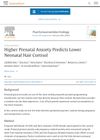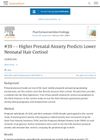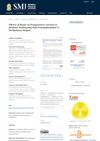 10 citations,
January 2012 in “International Journal of Trichology”
10 citations,
January 2012 in “International Journal of Trichology” The study found no link between anxiety, vitamin B12, folate, TSH, ferritin, zinc levels, and trichodynia in telogen alopecia patients.
 February 2024 in “Psychoneuroendocrinology”
February 2024 in “Psychoneuroendocrinology” Higher anxiety during pregnancy is linked to lower cortisol levels in newborns' hair.
 February 2024 in “Psychoneuroendocrinology”
February 2024 in “Psychoneuroendocrinology” Higher prenatal anxiety is linked to lower cortisol levels in newborns' hair.
 January 2023 in “Siriraj Medical Journal”
January 2023 in “Siriraj Medical Journal” Listening to music can help reduce anxiety before hair transplant surgery.
 8 citations,
September 2017 in “The Journal for Nurse Practitioners”
8 citations,
September 2017 in “The Journal for Nurse Practitioners” Most women with PCOS use positive coping strategies, but some with more psychological stress use negative ones.
 29 citations,
November 2018 in “Journal of The European Academy of Dermatology and Venereology”
29 citations,
November 2018 in “Journal of The European Academy of Dermatology and Venereology” Personality traits and anxiety affect hair loss patients' quality of life.
 58 citations,
September 1991 in “British Journal of Dermatology”
58 citations,
September 1991 in “British Journal of Dermatology” Women with AGA often face anxiety, depression, and low self-esteem; psychological support is important.
27 citations,
January 2020 in “Acta dermatovenerologica Alpina, Pannonica et Adriatica (Tiskana izd.)” Healthcare workers in Turkey experienced more skin problems due to frequent handwashing and wearing masks and gloves during the COVID-19 outbreak.
 23 citations,
August 2011 in “Journal of Dermatology”
23 citations,
August 2011 in “Journal of Dermatology” Finasteride helps hair loss patients' quality of life.
 42 citations,
June 2015 in “Gynecological Endocrinology”
42 citations,
June 2015 in “Gynecological Endocrinology” Women with PCOS often have mood disorders and a lower quality of life, and treatment should focus on both physical and mental health.
 43 citations,
March 2011 in “Journal of psychosomatic research”
43 citations,
March 2011 in “Journal of psychosomatic research” Kids with alopecia areata may experience more stress but not necessarily feel more anxious or depressed than others.
 37 citations,
January 2019 in “Food science & nutrition”
37 citations,
January 2019 in “Food science & nutrition” Bergamot may improve heart health, skin conditions, and mood, but more research is needed to confirm these benefits.
 6 citations,
June 2022 in “Frontiers in Psychiatry”
6 citations,
June 2022 in “Frontiers in Psychiatry” Many patients with various medical conditions experience anxiety, which worsens their quality of life and raises healthcare costs.
 10 citations,
January 2023 in “Journal of the European Academy of Dermatology and Venereology”
10 citations,
January 2023 in “Journal of the European Academy of Dermatology and Venereology” Alopecia areata greatly affects people's life quality, mental health, and work life.
 2 citations,
January 2021 in “Scandinavian Journal of Child and Adolescent Psychiatry and Psychology”
2 citations,
January 2021 in “Scandinavian Journal of Child and Adolescent Psychiatry and Psychology” Kids with skin problems are more likely to have mental health issues.
 September 2008 in “Fertility and Sterility”
September 2008 in “Fertility and Sterility” Greater intimacy leads to better self-reported health in couples having infertility treatment.
 67 citations,
May 2018 in “Journal of Ginseng Research”
67 citations,
May 2018 in “Journal of Ginseng Research” Red ginseng may improve immunity, fatigue, memory, blood circulation, and menopausal symptoms, and is generally safe to consume.
 77 citations,
November 2007 in “International Journal of Andrology”
77 citations,
November 2007 in “International Journal of Andrology” Testosterone with or without finasteride doesn't improve thinking skills in older men with low testosterone.
 7 citations,
June 2020 in “Experimental dermatology”
7 citations,
June 2020 in “Experimental dermatology” Researchers found that certain lipids, especially vitamin D3, are lower in prematurely grey hair than in pigmented hair.
 4 citations,
July 2001 in “Personality and Individual Differences”
4 citations,
July 2001 in “Personality and Individual Differences” Men with moderate hair loss had the best spatial thinking, and long-term DHT might affect cognition.
 June 2023 in “Dermatology and therapy”
June 2023 in “Dermatology and therapy” The Middle East and Africa need better data, treatment consensus, and support for Alopecia Areata.

Hair loss can cause significant social and emotional issues, especially for women and young men.
15 citations,
July 2021 in “JAMA Dermatology” Androgenetic alopecia negatively affects quality of life and self-esteem, especially in women, but not depression.
 March 2024 in “Healthcare”
March 2024 in “Healthcare” Stem cell treatment improved life quality and sexual function in women with hair loss.
 4 citations,
November 2022 in “Frontiers in Medicine”
4 citations,
November 2022 in “Frontiers in Medicine” People with alopecia areata are more likely to have anxiety and depression and a lower quality of life.
 January 2002 in “Dermatology + psychosomatics”
January 2002 in “Dermatology + psychosomatics”  20 citations,
August 2018 in “Clinics in Dermatology”
20 citations,
August 2018 in “Clinics in Dermatology” The conclusion is that understanding and addressing the psychological effects of alopecia areata is important for effective treatment.
 10 citations,
July 2021 in “International Journal of Rheumatic Diseases”
10 citations,
July 2021 in “International Journal of Rheumatic Diseases” Lupus patients' body image issues significantly affect their mental health and need more support.
 9 citations,
December 2014 in “Neuropsychiatric Disease and Treatment”
9 citations,
December 2014 in “Neuropsychiatric Disease and Treatment” People with first-time vitiligo have lower levels of a certain brain protein compared to healthy individuals.
 January 2009 in “Springer eBooks”
January 2009 in “Springer eBooks” The document concludes that treating skin conditions should include psychological care and a multidisciplinary approach is essential for effective management.



























